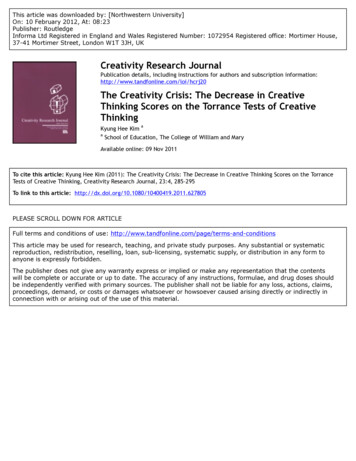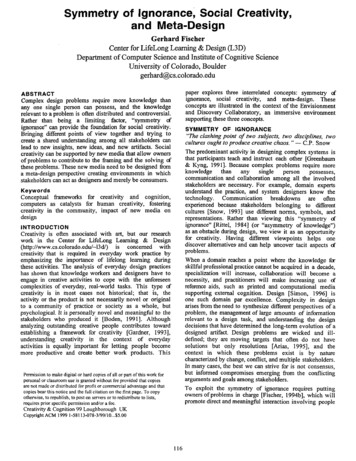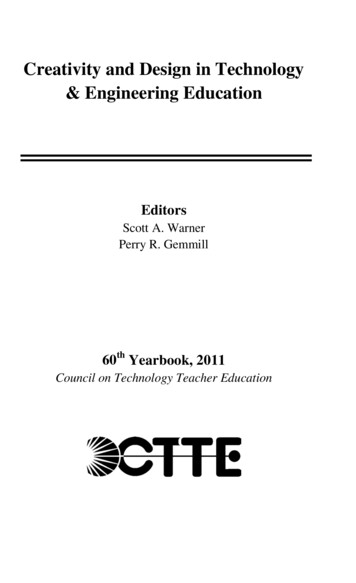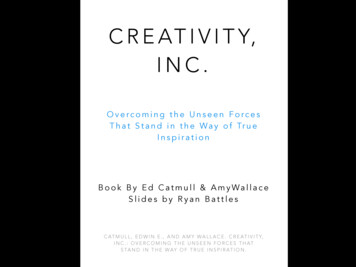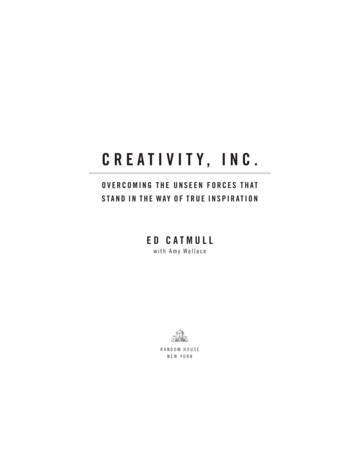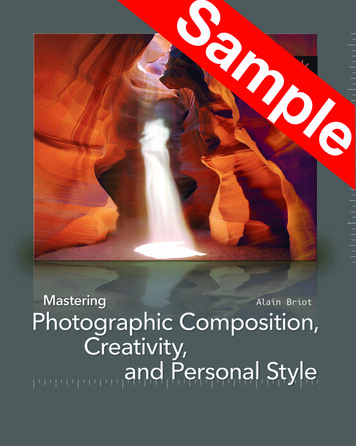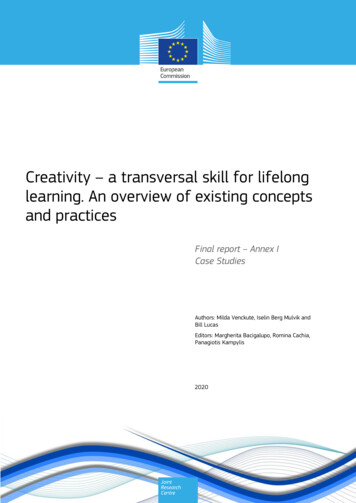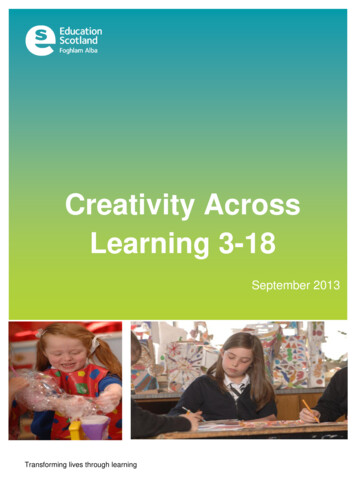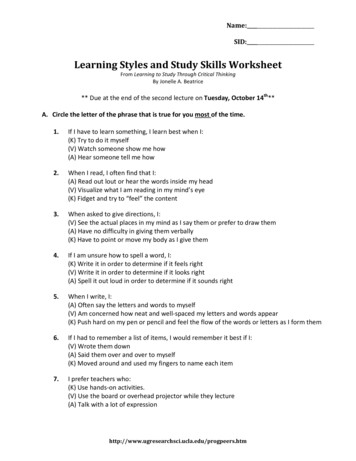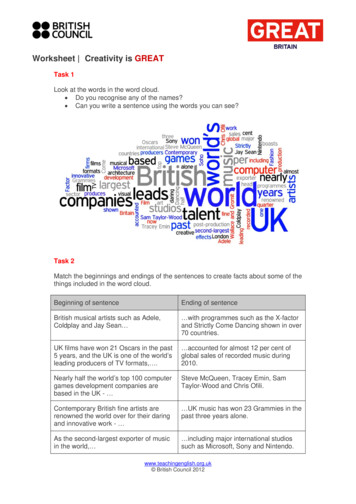
Transcription
Worksheet Creativity is GREATTask 1Look at the words in the word cloud. Do you recognise any of the names? Can you write a sentence using the words you can see?Task 2Match the beginnings and endings of the sentences to create facts about some of thethings included in the word cloud.Beginning of sentenceEnding of sentenceBritish musical artists such as Adele,Coldplay and Jay Sean with programmes such as the X-factorand Strictly Come Dancing shown in over70 countries.UK films have won 21 Oscars in the past5 years, and the UK is one of the world’sleading producers of TV formats, . accounted for almost 12 per cent ofglobal sales of recorded music during2010.Nearly half the world’s top 100 computergames development companies arebased in the UK - Steve McQueen, Tracey Emin, SamTaylor-Wood and Chris Ofili.Contemporary British fine artists arerenowned the world over for their daringand innovative work - UK music has won 23 Grammies in thepast three years alone.As the second-largest exporter of musicin the world, including major international studiossuch as Microsoft, Sony and Nintendo.www.teachingenglish.org.uk British Council 2012
Worksheet Creativity is GREATTask 3Look at the poster. Do you recognise the characters? What do you think their invention is?This link shows it in action: http://www.youtube.com/watch?v qXaNrujh-p0 Another contraption Wallace and Gromit have made is called the‘Snoozatron’. What do you think it might be?Follow this link to find out: http://www.youtube.com/watch?v ozzjOQFOKt0Task 4Discussion1. In pairs, talk about creativity.Consider the following: What does the word ‘creativity’ mean to you? As a pair, write your own definition. Do you know any creative people? In which ways are they creative? What is the most creative thing you have ever done?2. Do you agree with the poster’s statement ‘British talent leads the world’? Why?www.teachingenglish.org.uk British Council 2012
Worksheet Creativity is GREATTask 5Pre-reading vocabulary activityMatch the words to their definitions.WordDefinition1. windinga. small glass balls used in games2. reflectb. devoted to some purpose, causeor person3. devicec. the force that draws a substanceinto a vacuum4. marblesd. a model, or first example ofsomething, on which later formsof that product is based5. rubbere. not following a straight coursef.6. suction7. prototypeto reduce something to the leastpossible measure or amountg. an elastic material which comesfrom a tree8. launchh. the powerful effect that something(especially something new) hason a situation9. impacti.to cast back; mirrorj.a type of product made by aparticular company10. brand11. minimisek. a thing made or used for aspecific purposel.12. dedicatedto begin something or introducesomething newwww.teachingenglish.org.uk British Council 2012
Worksheet Creativity is GREATTask 6Read the following text about some British inventions of the 20th Century. Which do you think is most innovative?1935 – Cat’s EyesOne foggy night, Percy Shaw was driving on a dark winding road. His life was savedwhen a cat’s eyes reflected his car’s lights, which stopped him from going off the sideof the hill. After his near-death experience, Percy Shaw decided to create somethingsimilar to cats’ eyes by inventing a small device (made of two marbles placed closetogether in a rubber case) which would reflect oncoming car headlights to show theway ahead. Since their invention in 1935, ‘Cat’s Eyes’ have helped motorists to seewhere they are going and have surely prevented countless accidents like the onewhich Percy Shaw avoided. Shaw won an OBE in 1965 and died in September 1976.1983 – Bagless vacuum cleanerIn the late 1970s, James Dyson designed a bagless vacuum cleaner which would notlose suction as it picked up dirt. After five years, and over 5,000 prototypes, Dysonlaunched the ‘G-force’ cleaner in 1983. No manufacturer or distributer would launchhis product in the UK at that time, as they were concerned about the impact it mighthave on the cleaner-bag market. Consequently, Dyson launched it in Japan, where itwon the 1991 International Design Fair prize and sold for 2,000. Later, in 1993,Dyson set up his own manufacturing company in Wiltshire, England. Since then, theDyson vacuum cleaner has become one of the most popular brands in the UK and, in2005, it was the market leader in the US by value. In 1997, Dyson was awarded thePrince Phillip Designers Prize and in 2005 he was elected as a Fellow at The RoyalAcademy of Engineering.1993 – Wind-up radioTrevor Bayliss is another famous British inventor, whose personal focus is on usingtechnology in innovative ways to deal with social problems. He invented the wind-upradio to allow people living in remote areas to stay in touch with the world. In 1989,he watched a TV programme about the spread of AIDS in Africa and felt that oneway spread of the disease could be minimised would be by educating people throughradio broadcasts. Despite early rejection from everyone he approached, the turningpoint came when Bayliss’ wind-up radio was featured on a TV programme, creatinginterest from a number of investors. This enabled Bayliss to form his own company,and since then, Bayliss has received countless awards, met the Queen and NelsonMandela and travelled to Africa to produce a documentary about his life.Furthermore, Bayliss has updated the radio to include a solar panel so that it runs insunshine without winding. In June 2005, Bayliss received an honorary doctorate fromLeeds Metropolitan University and he now runs a company dedicated to helpinginventors develop and sell their chingenglish.org.uk British Council 2012
Worksheet Creativity is GREATTask 7Grammar focusThe present perfect tense and the past simple tenseWe use the present perfect tense to connect the past with the present. When weconnect the present with a specific point of time in the past, we use the word since.The form of the present perfect is:Subject have/ has past participleWhen we are not thinking about the past and present together, we don’t use thepresent perfect. If we are only thinking about the past, we use the past simple tense.www.teachingenglish.org.uk British Council 2012
Worksheet Creativity is GREATTask 8Grammar practiceComplete the following sentences taken from the text, using either the presentperfect tense or the past simple tense.a) In the late 1970s, James Dyson (design) a bagless vacuumcleaner which would not lose suction as it picked up dirt.b) Dyson (launch) the ‘G-force’ cleaner in 1983.c) Later, in 1993, Dyson (set up) his own manufacturing companyin Wiltshire, England.d) Since then, the Dyson vacuum cleaner (become) one of themost popular brands in the UK.e) In 1989, he (watch) a TV programme about the spread of AIDSin Africaf)Since then, Bayliss (receive) countless awards.g) In June 2005, Bayliss (receive) an honorary doctorate fromLeeds Metropolitan UniversityUse the text to check your answers.1. Now think about your own life and achievements. Think back to 2009. Write down five things you did in 2009, using the past simple tense. Write down 5 things you have done since 2009 using the present perfect tense.2. In groups, discuss what you did in 2009 and what you have achieved since then.Can you think of any other important things which happened in 2009 or have happened sincethen?www.teachingenglish.org.uk British Council 2012
Worksheet Creativity is GREATTask 9Extension activitiesOption 1Think of someone you consider to be creative and write a biographical article aboutthem.You should write about: why you think they are creativetheir achievementsfacts about their life- try to use the present perfect and present simple tenses with accuracyOption 2Think of an invention (like the ‘Snoozatron!) that would make your life much easier. Design and draw the contraptionAdd labels and diagrams to show how it worksPresent your idea to the rest of the class and vote for the best one!For more inspiration from Wallace and Gromit, follow this link:- You might want to try making your own contraption. See here for gromit/hands-on/www.teachingenglish.org.uk British Council 2012
In the late 1970s, James Dyson designed a bagless vacuum cleaner which would not lose suction as it picked up dirt. After five years, and over 5,000 prototypes, Dyson launched the ‘G-force’ cleaner in 1983. No manufacturer or distributer would launch his product in the UK at that time, as they were concerned about the impact it might
